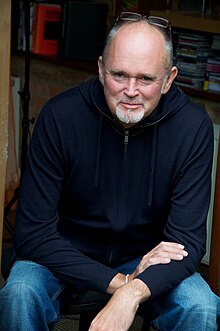Marc Marot
| Marc Marot | |
|---|---|
| Birth name | Marc Marot |
| Born | 5 May 1959 |
| Origin | Scarborough, North Yorkshire |
| Occupation(s) | Artist Manager, Visual Artist |
| Years active | 1979 - Now |
| Website | http://www.crowntalent.co.uk/ |
Marc Marot is a UK record executive and visual artist. He spent 9 years living in Germany and 3 years in the Yemen with his family before settling in the UK.
Marot started his professional career upon leaving art college in 1978. At 19 years old he joined members of prog-rock band Van der Graaf Generator in an offshoot collective called The Pool of Sound, who for three years performed on the live music circuit but were unsuccessful in securing a record deal. He supplemented the living he made from music by working as a landscape gardener and whilst doing so picked up the physically debilitating illness toxoplasmosis which resulted in him giving up touring. He moved to London where he got a job as a counter assistant at the Hounslow branch of Our Price Records.
Whilst he was working five days per week at Our Price Records, he also worked voluntarily at independent music publisher Eaton Music on his day off. In 1982 Terry Oates, the owner of Eaton Music gave Marot his first major break by appointing him as Professional Manager at 22 years old. In 1984, Marot was headhunted by Nick Stewart, the Island Records head of A & R who was responsible for signing U2. Marot's new position was general manager of Blue Mountain Music. In an interview with The Independent Marot described the amusing circumstances of his beginnings at Blue Mountain: "I immediately said: `Yes. It was Island and I desperately wanted to work for Island,' says Marot who, with his brother, had been a collector of the label's records for years. What he didn't know was that Blue Mountain was also the personal company of Chris Blackwell, the place where he stashed all his favourite assets like Bob Marley's catalogue, Free and U2.
'He was pissed off that they had hired someone he hadn't met and instructed the guy who did it to tell me to go. But he didn't,' Marot recalled. He was fobbed off for weeks with a 'trickle of excuses' as to why he couldn't start work. Frustrated, he eventually just turned up and asked for a telephone. 'About three days later, Blackwell summoned me to his office. My living legend was just about to fire me before I'd even started,' Marot said.
...
Wikipedia

